We may not have the course you’re looking for. If you enquire or give us a call on 01344 203999 and speak to our training experts, we may still be able to help with your training requirements.
Training Outcomes Within Your Budget!
We ensure quality, budget-alignment, and timely delivery by our expert instructors.
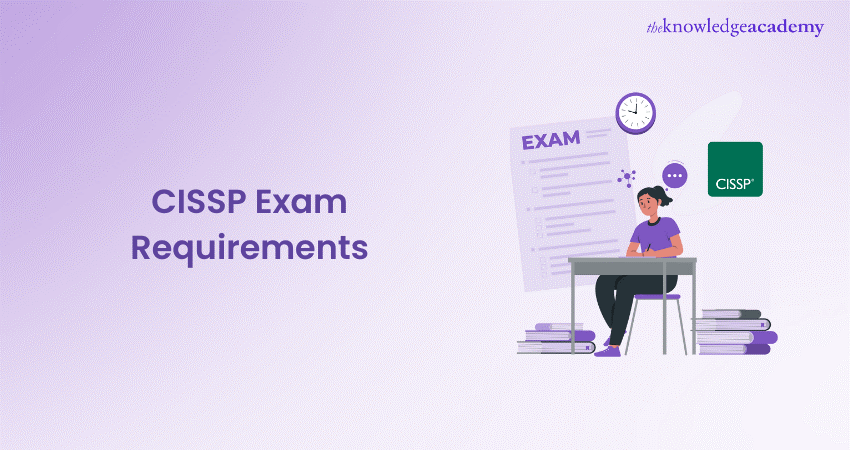
Navigating the complex landscape of Cybersecurity demands not only technical prowess but also adherence to rigorous standards. Understanding the CISSP Exam Requirements is paramount for individuals aspiring to excel in this dynamic field. CISSP, standing as a hallmark in information security, necessitates comprehensive preparation and fulfilment of stringent criteria. Discover the key CISSP Exam Requirements to help you prepare effectively. Learn about eligibility criteria, prerequisites, and registration details.
Table of Contents
1) What Is CISSP?
2) Why should you take the CISSP examination?
3) CISSP experience requirements
4) Cost Involved in Attaining CISSP
5) CISSP Common Body of Knowledge (CBK) - Ten Domains
6) Conclusion
What Is CISSP?
The CISSP credential is widely regarded as a pinnacle achievement in information security, renowned globally for its thoroughness and comprehensiveness. Administered by the International Information System Security Certification Consortium (ISC)², CISSP certification confirms an individual's skill and proficiency in crafting, executing, and overseeing a robust cybersecurity strategy.
Additionally, CISSP holders exhibit a profound grasp of various essential domains within information security, such as access control, cryptography, security architecture, network security, risk management, and security operations. They excel in implementing industry standards and best practices to protect organisations' assets, systems, and data against a diverse range of threats.
Furthermore, obtaining the CISSP certification involves passing a demanding exam comprising 250 multiple-choice questions that assess both the breadth and depth of cybersecurity knowledge. Furthermore, candidates must fulfil stringent experience criteria, typically possessing a minimum of five years of cumulative work experience across two or more of the eight CISSP domains.
Professionals holding CISSP certification play crucial roles across many industries, serving as leaders, consultants, architects, and managers in the realm of cybersecurity. Their expertise is indispensable in ensuring information assets' confidentiality, integrity, and availability, thereby mitigating risks and fortifying organisations against cyber threats within an increasingly interconnected environment.
Why should you take the CISSP examination?
The CISSP certification, awarded by the International Information System Security Certification Consortium (ISC)², is a widely acknowledged cybersecurity credential bestowed upon qualified individuals. It attests to an IT professional's proficiency in effectively devising, executing, and supervising cybersecurity initiatives.
Regarded as essential for career progression within the cybersecurity field, the CISSP certification offers numerous advantages. These encompass elevated salaries, expanded career prospects, heightened industry recognition, and a deeper comprehension of cybersecurity fundamentals.
Moreover, attaining this certification grants membership in one of the largest associations of cybersecurity experts globally, along with the associated perks and privileges. The CISSP certification, administered by ISC², essentially serves as a hallmark of cybersecurity expertise.
It validates professionals' capabilities in developing and managing robust cybersecurity programs. Earning CISSP not only enhances career prospects but also provides access to a global network of cybersecurity professionals, fostering continuous learning and collaboration.
CISSP Experience Requirements
Below are the various experience requirements for the CISSP certification:
1) Acceptable credentials
Below are the acceptable credentials for the CISSP certification:
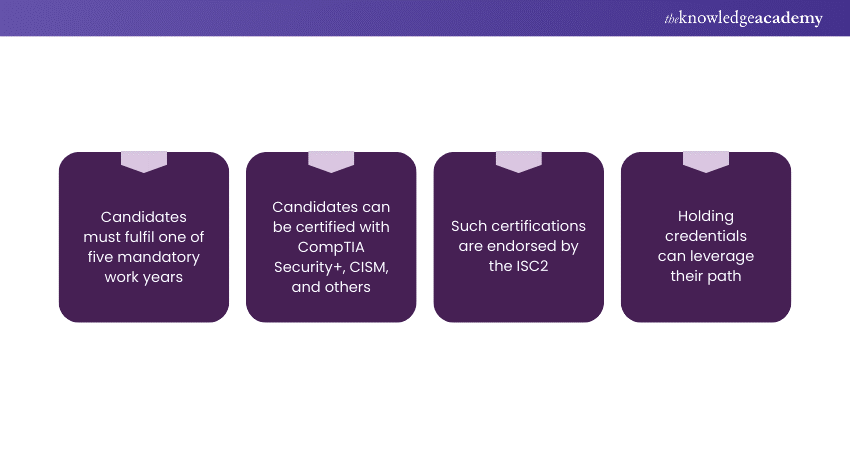
a) CISSP eligibility route: Individuals possessing acknowledged certifications can leverage this route to fulfil one year of the mandatory five-year work experience criterion. These certifications signify that candidates possess expertise and competencies in the realm of Information Security.
b) Examples of accepted credentials: These include certifications like CompTIA Security+, Certified Information Security Manager (CISM), Certified Information Systems Auditor (CISA), and other certifications endorsed by (ISC)².
2) Demonstration of practical application
Candidates have to prove their history of practical application for the CISSP certification in the following ways:
a) Professional background in these domains should entail roles and tasks directly pertinent to Information Security.
b) Candidates must demonstrate how they've applied security principles and industry standards to safeguard systems, networks, data, and enterprises effectively.
3) CISSP domains
The test assesses proficiency across eight areas:
a) Security and Risk Management
b) Asset security
c) Security Architecture and Engineering
d) Communication and Network Security
e) Identity and Access Management
f) Security Assessment and Testing
g) Security operations
h) Software Development Security
Furthermore, it comprises multiple-choice questions and advanced queries lasting four hours. Available languages include English, Chinese, German, Japanese, Korean, and Spanish. A passing score of 700 out of 1000 is required.
4) Yearly maintenance fee
The CISSP exam fee is £710, encompassing the assessment of the candidate's competence in eight information security domains. Additional expenses may arise for study resources, training programs, and membership fees should candidates opt to join professional organisations like (ISC)².
5) Continuing Professional Education (CPE) Credits
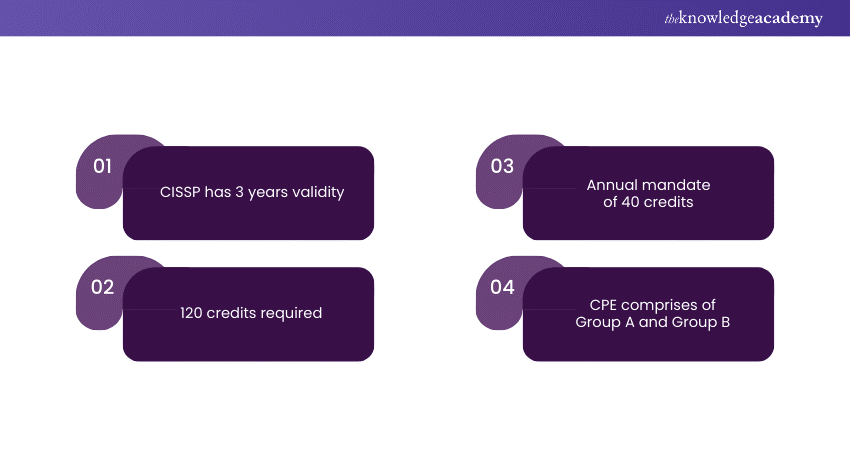
The CISSP certification has a validity of three years, requiring recertification within this period through the accumulation of Continuing Professional Education (CPE) credits. A total of 120 CPE credits is necessary over the three-year cycle, with 40 CPE credits mandated annually. Failure to meet this requirement necessitates retaking the exam.
Furthermore, to earn CISSP CPE credits, activities are categorised into Group A and Group B. Recertification entails obtaining 90 Group A CPEs and 30 Group B CPEs.
Group A CPEs involve engagements within the eight domains of CBK through projects or tasks beyond regular job responsibilities. This includes attending educational courses, seminars, and workshops in information security, contributing to security publications, and engaging in professional activities within the field.
Group B CPEs encompass activities outside the eight domains aimed at enhancing general professional skills and knowledge. Examples include public speaking engagements or management courses.
6) Endorsement procedure
Upon successfully passing the CISSP exam, certification requires endorsement by an active ISC2 member before becoming official. This endorsement confirms your requisite experience and affirms your ethical and professional conduct.
Protect your sensitive data and stay compliant by signing up for our CCSP Security Cloud Security Professional Course now!
Costs involved in attaining CISSP
Below are the costs in attaining CISSP:
1) CISSP Exam Preparation
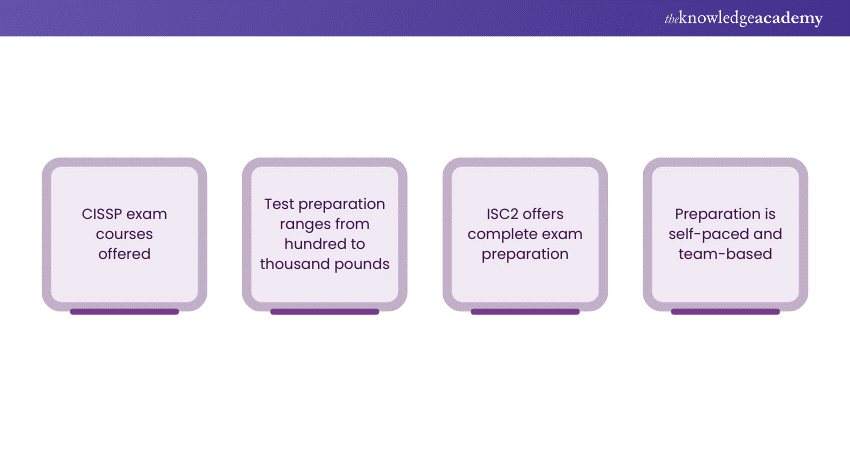
Numerous institutions offer CISSP exam readiness courses, with costs fluctuating significantly. Factor in test preparation expenses, which might range from several hundred to several thousand pounds, when budgeting for the CISSP exam. (ISC)² offers diverse exam preparation methods, such as self-paced, instructor-led, and team-based options. These services could exceed £1591. To meet the CISSP exam requirements, candidates typically require three to six months for thorough preparation and completion of the course prerequisites.
2) CISSP Exam Expenses
The cost of the CISSP exam is £595. Participants who finish CISSP test preparation courses may receive vouchers from affiliated entities.
3) Recertification Expenses
To maintain their CISSP credentials, individuals must meet renewal requirements every three years. Each credential holder must accrue 120 continuing professional education (CPE) credits within this period. The expenses associated with obtaining CPE credits can vary significantly. However, every certified individual is obligated to pay an annual fee of $100 to (ISC)².
CISSP Common Body of Knowledge (CBK) - Ten Domains
CISSP comprises eight key areas or domains, known collectively as the ‘Common Body of Knowledge CBK’. These domains are described as follows:
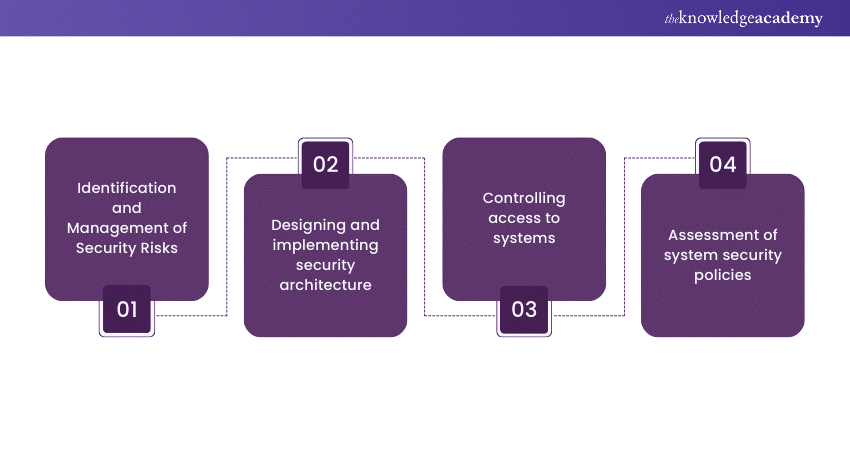
a) Security and Risk Management: Focuses on identifying and managing security risks within an organisation's systems and operations.
b) Asset Security: Concerns safeguarding physical and digital assets, including data protection and asset handling procedures.
c) Security Architecture and Engineering: Involves designing and implementing secure systems and infrastructure to protect against threats.
d) Communication and Network Security: Addresses securing network infrastructure, data transmission, and communication channels to prevent unauthorised access.
e) Identity and Access Management: Deals with controlling access to systems and data, managing user identities, and enforcing access policies.
f) Security Assessment and Testing: Involves evaluating the security posture of systems through assessments, audits, and penetration testing.
g) Security Operations: Focuses on the day-to-day management of security operations, including incident response, monitoring, and maintaining security controls.
h) Software Development Security: Concerns integrating security into the software development lifecycle to mitigate vulnerabilities and ensure secure coding practices.
Validate your Cloud Security expertise by signing up for our CISSP Training now!
Conclusion
In conclusion, navigating the CISSP Exam Requirements demands dedication, expertise, and ongoing commitment to professional development. Achieving CISSP certification not only validates one's proficiency in Information Security but also signifies a dedication to maintaining ethical standards and advancing the cybersecurity field.
Frequently Asked Questions

Candidates can take the CISSP exam as many times as needed, but there must be a minimum of 30 days between attempts.

To pass the CISSP exam, candidates must achieve a scaled score of 700 points or higher out of a possible 1000 points.

The Knowledge Academy takes global learning to new heights, offering over 30,000 online courses across 490+ locations in 220 countries. This expansive reach ensures accessibility and convenience for learners worldwide.
Alongside our diverse Online Course Catalogue, encompassing 17 major categories, we go the extra mile by providing a plethora of free educational Online Resources like News updates, Blogs, videos, webinars, and interview questions. Tailoring learning experiences further, professionals can maximise value with customisable Course Bundles of TKA.

The Knowledge Academy’s Knowledge Pass, a prepaid voucher, adds another layer of flexibility, allowing course bookings over a 12-month period. Join us on a journey where education knows no bounds.

The Knowledge Academy offers various CISSP Training Courses, including CISSP Certification Course, Information Systems Security Management Training and more. These courses cater to different skill levels, providing comprehensive insights into Project Management methodologies.
Our IT Security & Data Protection Blogs cover a range of topics related to CISSP, offering valuable resources, best practices, and industry insights. Whether you are a beginner or looking to advance your CISSP skills, The Knowledge Academy's diverse courses and informative blogs have you covered.
Upcoming IT Security & Data Protection Resources Batches & Dates
Date
 CISSP Certification
CISSP Certification
Mon 6th Jan 2025
Mon 24th Mar 2025
Mon 19th May 2025
Mon 14th Jul 2025
Mon 8th Sep 2025
Mon 17th Nov 2025







 Top Rated Course
Top Rated Course



 If you wish to make any changes to your course, please
If you wish to make any changes to your course, please


